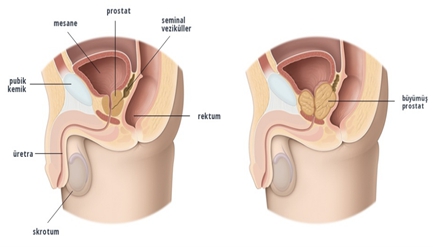
Prostate Health and Benign Prostatic Hyperplasia (BPH)
The prostate is a gland located in the lower urinary tract, in the lower part of the bladder, around the urethra (the urinary canal at the bladder outlet). It is found only in men. It secretes a fluid that is found in one-third of the semen. A healthy prostate is approximately the size of a large walnut and its volume is 15-25 ml. As men get older, the prostate also grows slowly. Prostate diseases usually occur with hormonal changes that occur in men as they get older. They cause disturbing symptoms in the lower urinary tract in men over 50 years of age. These symptoms are most often caused by an enlarged prostate, a disease known as benign prostatic hyperplasia (BPH). BPH is the most frequently diagnosed disease in urology. Benign prostatic hyperplasia occurs in approximately half of men in their 70s; In older age group patients, it causes Lower Urinary System Symptoms (LUTS) in approximately 90% of cases. It has also been stated that BPH is accompanied by chronic inflammation.

The severity and duration of this chronic inflammation in Benign Prostatic Hyperplasia
It is an important factor that determines how much the tissue will grow.
Benign Prostatic Hyperplasia
It is important to know that you do not have prostate cancer. Even if BPH is left untreated, it does not turn into prostate cancer. However, BPH and prostate cancer may develop with age and may occur together.
Benign Prostate Hyperplasia Symptoms:
It may affect the retention (storage) of urine in the bladder;
Need to urinate more frequently than normal
Needing to wake up at night to urinate
Sudden need to urinate and inability to postpone this need
involuntary urinary leakage
BENIGN PROSTATE HYPERPLASIA (BPH) and NOPROST
Noprost is a food supplement that aims to relieve complaints and mild-to-moderate symptoms experienced in benign prostate enlargement, chronic prostatitis and to support prostate health in general. In addition to dwarf palm and nettle, Quercetin, a very powerful anti-inflammatory, has been added to the formula. The absorption (bioavailability) of quercetin is increased by Bromelain and Papain enzymes.
Noprost Components
Saw Palmetto fruit extract: It is the most common phytotherapeutic agent used for the symptomatic treatment of BPH. It is widely used to relieve urination disorders such as dysuria, urinary frequency, nocturia and urinary retention.
Urtica dioica (Nettle) root extract: It is a widely used phytotherapeutic agent in BPH that slows down and suppresses the growth of the prostate.
Quercetin: It is a herbal ingredient taken into the body with many different fruits and vegetables such as apples, tea, onions and red grapes. It has been stated in studies that quercetin has an anti-inflammatory (inflammation suppressor) effect.
Bromelain and Papain: Enzymes called Bromelain obtained from the pineapple plant and Papain obtained from the papaya plant have anti-inflammatory effects. They also increase the bioavailability of quercetin in the body.
Noprost Components:
| Components | Amount (2 Tablets) |
| Saw Palmetto fruit extract | 600 mg |
| Nettle (Urtica dioica) root extract | 280 mg |
| Quercetin | 120mg |
| Bromelain | 40 mg |
| Papain | 20 mg |



